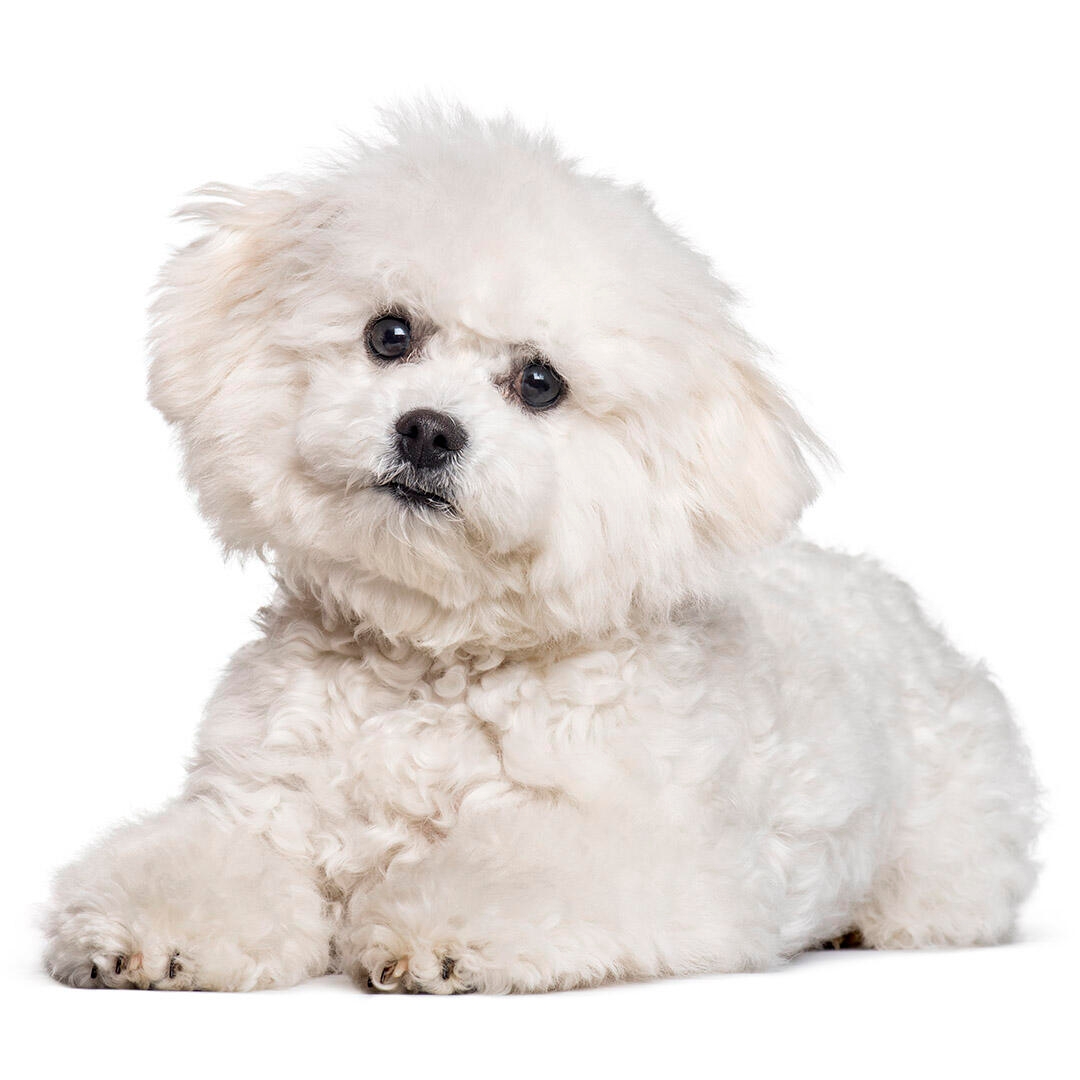
| Family-friendly: | 5/5 |
| Exercise needs: | 3/5 |
| Easy to train: | 5/5 |
| Tolerates being alone: | 1/5 |
| Likes other pets: | 4/5 |
| Energy level: | 5/5 |
| Grooming needs: | 4/5 |
| Shedding: | 2/5 |
Bichon Frise dogs can suffer from:
- Patellar luxation
- Skin allergies
- Cataracts which is a condition where the lens in the eye becomes cloudy and this can result in blindness.
- Bladder stones which are where minerals collect in the bladder forming stones which cause pain and discomfort.
- Portosystemic shunts which is a condition where the blood does not pass through the liver normally, which leads to toxin build-up.
- Diabetes mellitus which is a conditions where dogs develop very high sugar levels because they do not produce a normal amount of insulin.
Priority Kennel Club health schemes and testing:
- Eye screening scheme
Well-balanced dogs with smart appearances, Bichons are small and solid. Their jet-black eyes and noses contrast against their snow-white coats, and their tails are like plumes which are curved and carried over their backs. Their silky coats, which consist of spirally formed hair, give them the appearance of powder puffs. The adult male and female Bichon Frise size is 23-28 cm and they weigh approximately 3-6 kg. Although the most common Bichon Frise colours are white and cream, they can also boast different mixes like white and apricot, or white and buff.
These lively, happy little dogs adore family life. They love to accompany the family on all outings, but can be taught to be left alone occasionally. They socialise well and are fine in the company of other dogs and pets in the household.
| Family-friendly: | 5/5 |
| Exercise needs: | 3/5 |
| Easy to train: | 5/5 |
| Tolerates being alone: | 1/5 |
| Likes other pets: | 4/5 |
| Energy level: | 5/5 |
| Grooming needs: | 4/5 |
| Shedding: | 2/5 |
Centuries ago, the Bichon Frise dog breed was popular in France and Spain, and the Bichon has been depicted in portraits of the royal families of both countries. Bichon-type dogs were developed on different islands in the Mediterranean, and Tenerife is where the Bichon Frise dog breed is thought to have originated. The Bichon of Malta (known as the Maltese today) is a close relative. 14th-century sailors are thought to have taken them over to Europe from Tenerife.
The Bichon owner needs to have an interest in training and grooming, though they’re forgiving enough for you to learn as you go. Ideally home most of the day and capable of a 30-minute walk morning and evening, so not too athletic – however this bundle of fluff hides an energetic and clever breed so you need to be ready to match that with games and play.
Bichon Frise dogs will adapt readily to the amount of exercise available from the family circumstances, but half an hour should be considered the minimum daily requirement - along with a chance to exercise their brains!
The Bichon Frise is a small dog who can live in a flat or a smaller property as long as they have access to the outdoors for toileting and walks.
Small dogs have a fast metabolism, meaning they burn energy at a high rate, although their small stomachs mean that they must eat little and often. Small-breed foods are specifically designed with appropriate levels of key nutrients and smaller kibble sizes to suit smaller mouths. This also encourages chewing and improves digestion. Proper nutrition along with care can contribute to a Bichon Frise lifespan reaching 15 years.
The Bichon Frise grooming process requires some effort. The non-shedding coat should be combed thoroughly every day. Trimming is required occasionally to prevent the coat from becoming too long. To keep the show-ring appearance of a 'powderpuff', it is recommended to use a professional groomer every five to six weeks.
As eager learners, the Bichon Frise dog breed is relatively easy to train. They will happily learn tricks and commands, provided you always use positive reinforcement and fun games. One thing to know about Bichon Frise dogs is that they can be resentful, and will not respond well to scolding, so it’s important that you approach them with a firm, but gentle hand when training.
Despite being a toy breed, Bichons are surprisingly robust and so are a good choice for a family with slightly older children but can get along with younger ones too, as long as games to not get too boisterous. They can also happily live with other dogs and cats.
While many dogs are traditionally thought of as being good with children, all dogs and children need to be taught to get on with and respect each other, and be safe together. Even so, dogs and young children should never be left alone together and adults should supervise all interactions between them.
The Bichon Frise lifespan is actually dependent on where they live, with the average Bichon Frise getting to live a longer life of 16 years in the UK and shorter, of only 12-13 years, in the U.S. and Canada. On average, however, the Bichon Frise lifespan is 15 years.
Shedding in a Bichon Frise is minimal, but they do need more grooming than other dog breeds to keep their coat in good condition and to avoid knots.
Yes, Bichon Frises are highly trainable as they are typically very eager to please their owners. They do need, however, a lot of dedication, consistency, and positive reinforcement as they can be quite stubborn at times.
No, the Bichon Frise dog breed is practically odourless unless they get into something, or have an underlying disease.